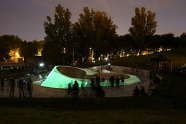Liverpool Biennial and AccorHotels Commission New Artwork by Raphael Hefti for Pullman Liverpool

Raphael Hefti's live performance on site at Kings Dock. Photo: Nick Mizen

Raphael Hefti's live performance on site at Kings Dock. Photo: Nick Mizen

Raphael Hefti's live performance on site at Kings Dock. Photo: Nick Mizen

Raphael Hefti's live performance on site at Kings Dock. Photo: Nick Mizen
Raphael Hefti's live performance on site at Kings Dock. Photo: Nick Mizen
Liverpool Biennial and AccorHotels have commissioned a new site-specific artwork by award-winning, Swiss-born artist Raphael Hefti for the newly launched Pullman hotel in Liverpool.
The artist has transformed part of Kings Dock into a makeshift foundry and film set, which will also function as a stage for a live performance. During a special live performance on 19 May, invited guests will witness Hefti demonstrate his signature thermite welding technique, a dramatic process for melting and joining steel. The performance will be recorded from start to finish, and the resulting film will be screened in the Pullman hotel as a new artwork that same evening.
This week, Hefti began construction at his improvised outdoor studio built specifically for the project next to Pullman Liverpool, situated at Kings Dock on the world-famous waterfront and adjoining ACC Liverpool. Hefti and his team are using an 80-tonne pile of sand as a makeshift foundry: lava-like flows of liquid metal will pour down the sand, sending sparks flying into the air. Hefti references heavy labour and iron casting, revealing the backbone of contemporary industry – processes that have long histories but that usually remain hidden.
On Thursday 19 May, two weeks after Hefti first started work, hotel guests and residents will be able to view the performance and its accompanying film via in-room television screens and in the open plan lobby. The finished edit will complement the collection of carefully curated artwork already adorning the walls of the hotel in the form of dramatic large scale graphics, reflecting the hustle and bustle of docklands life.
The project is inspired by the story of a buoy that washed up on Formby Beach in January 2015, thought to have broken free from its mooring in strong winds. For Hefti, this huge metal buoy came to symbolise Liverpool’s maritime history as a crucial trading point throughout the 19th century. Using thermite welding – a technique invented for the reparation of train tracks – points to the instrumentality of the railway network and the Pullman mainline luxury railway service in securing the transportation of raw materials, finished goods and passengers between the Port of Liverpool and the rest of the country.





